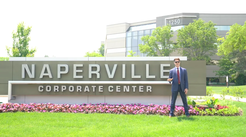In the remote corners of the globe, where offshore oil rigs rise against the horizon and carpenters work to rebuild war-torn communities and underdeveloped regions, employers face the most pressing challenge: ensuring the safety, well-being, and rights of their workers. These workers, whether they’re manning a coffee shop on an oil platform, repairing infrastructure in post-conflict zones, or providing skilled labor in high-risk regions, are often exposed to dangers far beyond the ordinary. When accidents occur, the struggles within the international workers’ compensation can be a daunting task.
Overseas companies operating in these environments - such as Africa, the Middle East, Southeast Asia, and others - mostly employ a mix of local and international workers. The stakes are high with billions of dollars invested in critical infrastructure and operations. Yet these employers frequently struggle with fragmented support systems, outdated legal frameworks, and the logistical difficulties of providing appropriate care to injured employees in these hostile regions. Ryan Hawley, founder of Odin Industries, states, “When someone is injured, the first challenge is finding medical resources that meet the standards we’re used to in the U.S. while also adhering to local regulations.”
Furthermore, the needs change for workers depending on the type of operation and the situation. Under the Defense Base Act (DBA), which covers contractors working for U.S. multinationals and defense contractors, many claims involve foreign nationals. Employers have to ensure access to medical care that is properly documented to meet American legal and insurance standards—which often requires training local physicians to prepare reports aligned with the American Medical Association’s guidelines while balancing privacy laws and local regulations.
For workers in isolated environments, the main challenge is logistics. “When someone is injured, for example, on an offshore oil rig, it’s about orchestrating the chain of events smoothly—getting them off the rig, transporting them to the mainland, and ensuring they have access to proper medical facilities,” the Odin Industries founder emphasizes.
Ryan shares another instance. In regions with minimal healthcare infrastructure, a fractured femur may require emergency evacuation to another country for treatment and rehabilitation before the worker can safely return. “We’ve handled cases for our client’s employees where specialized orthopedic care simply didn’t exist locally,” he adds.
For voluntary foreign workers, the challenges are broader. Employers often need to address pre-travel vaccination requirements, local healthcare navigation, and emergency evacuation plans. When accidents happen, the retrieval and management of medical records from underdeveloped systems become critical for processing insurance claims.
Odin Industries, founded with a mission to streamline and humanize international workers’ compensation, has become a lifeline for companies operating in high-risk zones. The company offers a range of specialized services tailored to meet the unique challenges faced by these employers.
One of its most critical services is facilitating medical care in remote or resource-poor areas. By collaborating with local healthcare providers, Odin Industries ensures its clients’ workers receive care that meets international standards. The company also provides training to local physicians to prepare documentation that adheres to U.S. insurance and legal requirements, helping bridge the gap between American expectations and local capabilities.
In cases requiring financial compensation, Odin Industries acts as a safeguard against potential missteps. “When you’re wiring substantial amounts to a claimant in Uganda, for example, you can’t afford to make a mistake,” the founder notes. The company conducts test wires and sanctions checks and provides documentation to banks, ensuring that claimants receive their compensation legally and securely.
Emergency evacuations are another cornerstone of Odin Industries’ services. From extracting injured workers in conflict zones to relocating them for specialized care, its operations are built to function in the world’s most challenging environments. “We’ve handled everything from medical emergencies to natural disasters. We are helping employers fulfill their duty of care by ensuring workers get the care they need,” Ryan says.
Despite its success, Odin Industries has observed - and faced - a few challenges in the industry. “The time zone management itself is a logistical nightmare,” the founder admits. “Our American-based nurses are often working with providers in places like Africa, Kosovo, or the Philippines—which means 8- to 12-hour time differences.”
To address this, Ryan hopes to establish a physical presence, starting with Africa, where the demand for their services is highest. “This significant step will not only improve our operational efficiency but also help us provide better support on the ground,” he firmly states.
Another challenge is the unpredictable nature of geopolitical events. “While there’s no major ongoing conflict at the moment with the U.S., we’ve prepared ourselves for whatever happens worldwide—whether it’s reconstruction or evacuation assistance,” he says. “Anticipating these needs and being first to aid is especially crucial in our industry.”
The Odin Industries founder even highlights the evolving legal landscape as a consequential hurdle. “The DBA was never designed for combat zones, so we have to constantly adapt to the new case law and legal interpretations,” he says. This fluidity requires a deep understanding of both local and international regulations, as well as close collaboration with legal experts and government agencies—which Ryan and his team actively engage in.
With a global network of healthcare providers, cutting-edge technology, and an unwavering commitment to ethical practices, Odin Industries is setting a new standard in international workers’ compensation. “Our work is challenging, but it’s also incredibly rewarding,” the founder concludes. “At the end of the day, it’s about making sure that our clients’ workers, no matter where they are, know that someone has their back.”
Media Contact
Name: Ryan Hawley
Email: [email protected]






